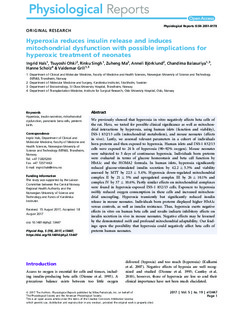Hyperoxia reduces insulin release and induces mitochondrial dysfunction with possible implications for hyperoxic treatment of neonates
Hals, Ingrid Kathrin; Ohki, Tsuyoshi; Singh, Rinku; Ma, Zuheng; Björklund, Anneli; Balasuriya, Chandima Nirupa Dilruks; Scholz, Hanne; Grill, Valdemar Erik Robert
Journal article, Peer reviewed
Published version

Åpne
Permanent lenke
http://hdl.handle.net/11250/2479237Utgivelsesdato
2017Metadata
Vis full innførselSamlinger
Originalversjon
10.14814/phy2.13447Sammendrag
We previously showed that hyperoxia in vitro negatively affects beta cells of the rat. Here, we tested for possible clinical significance as well as mitochondrial interactions by hyperoxia, using human islets (function and viability), INS‐1 832/13 cells (mitochondrial metabolism), and mouse neonates (effects in vivo). Lastly, we assessed relevant parameters in a cohort of individuals born preterm and then exposed to hyperoxia. Human islets and INS‐1 832/13 cells were exposed to 24 h of hyperoxia (90–92% oxygen). Mouse neonates were subjected to 5 days of continuous hyperoxia. Individuals born preterm were evaluated in terms of glucose homeostasis and beta cell function by HbA1c and the HOMA2 formula. In human islets, hyperoxia significantly reduced glucose‐stimulated insulin secretion by 42.2 ± 5.3% and viability assessed by MTT by 22.5 ± 5.4%. Hyperoxia down‐regulated mitochondrial complex II by 21 ± 5% and upregulated complex III by 26 ± 10.1% and complex IV by 37 ± 10.6%. Partly similar effects on mitochondrial complexes were found in hyperoxia‐exposed INS‐1 832/13 cells. Exposure to hyperoxia swiftly reduced oxygen consumption in these cells and increased mitochondrial uncoupling. Hyperoxia transiently but significantly reduced insulin release in mouse neonates. Individuals born preterm displayed higher HbA1c versus controls, as well as insulin resistance. Thus, hyperoxia exerts negative effects in vitro on human beta cells and results indicate inhibitory effects on insulin secretion in vivo in mouse neonates. Negative effects may be lessened by the demonstrated swift and profound mitochondrial adaptability. Our findings open the possibility that hyperoxia could negatively affect beta cells of preterm human neonates.
